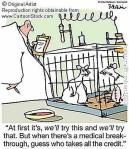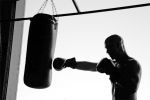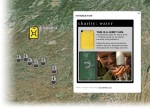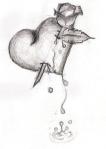 The scientist walked up to her office earlier than usual that Friday. She was carrying a paper bag bulging with jars and chemical paraphernalia. She wrapped her right hand around the paper bag, clutching it at her side so tightly that the mid-section of the bag was heavily creased, and in her left hand, she fondled with her keys, trying to find the correct key for her door. A brown, slim handbag hang loosely from her left shoulder, and presently it slid in front of her belly as she bent to reach the door knob. Holding the door ajar with her left elbow, she carefully injected herself, sideways, into the dimly lit office. She dropped her keys on her table and pulled the dangling pull-string that was the switch to the overhead light. The light flickered for a few seconds, then gradually lit up the room. She sighed and set the paper bag on the tiny space still available at her table.
The scientist walked up to her office earlier than usual that Friday. She was carrying a paper bag bulging with jars and chemical paraphernalia. She wrapped her right hand around the paper bag, clutching it at her side so tightly that the mid-section of the bag was heavily creased, and in her left hand, she fondled with her keys, trying to find the correct key for her door. A brown, slim handbag hang loosely from her left shoulder, and presently it slid in front of her belly as she bent to reach the door knob. Holding the door ajar with her left elbow, she carefully injected herself, sideways, into the dimly lit office. She dropped her keys on her table and pulled the dangling pull-string that was the switch to the overhead light. The light flickered for a few seconds, then gradually lit up the room. She sighed and set the paper bag on the tiny space still available at her table.
One glance at her office and you would immediately know she wasn’t the type to appreciate interior designs and decorations. All across her floor, papers and books were casually thrown in bundles and piles. She had a bookshelf, but it was already full with other publications, lab notebooks, and more papers. There were a few binders on the shelf, but those, too, were overflowing with documents and dog-eared print-outs. On her table, she had a Dell laptop hooked to a printer positioned posterior to the computer. There were a few sheaves of paper jutting from the printer tray and some had dropped around the base of the printer. A couple of pens and pencils were strewn on the table, and the book she had been reading last night was still open to the page she left it on. Her rotating chair was sandwiched in a heap of boxes and could no longer make the full turn. Consequently, she had to twist herself around so as to maneuver herself onto the seat.
She had a perplexed look on her face. Yesterday had not been one of her best days. She had been unable to understand some of her data, and had gone home, slept on it, but found neither insight nor inspiration from rest. She had woken up around four in the morning, thinking that she heard some strange noise in her living room. She groped around in the dark in search of the flash light she usually kept in her bedside drawer but remembered she had moved it the previous night. Her fingers felt something solid and cold. She grabbed it, squinted sleepily at it and made as if to replace it but immediately decided against it. By now, her eyes were growing accustomed to the darkness around her but her mind was still hazy from sleep. She slithered out of bed and slid her feet in her bathroom flip-flops, and silently made for the door. She turned the door knob slowly, pausing to catch her breath every time she thought she had the hinges creak. “I will have to call the repair man in the morning,” she thought.
She cautiously popped her head outside her bedroom door and peered into the hall connecting her living room and her bedroom. On her left side was the bathroom, and on her right, the closet she rarely used. It was filled with decrepit equipment she had felt too sentimentally attached to trash. The door to her bathroom was slightly ajar. The sound of water leaking on the enamel tub resonated with the ticking of the grandfather clock above the fireplace in the living room. She had got used to the rhythm of the ticking clock that she strangely felt at ease anywhere near clocks. Occasionally, she would sit under the city clock at the Square just to enjoy the monotony of the tic-tac-tic. Her friends often commented on her strange attachment to clocks but she often brushed their opinions aside as unsophisticated or simply jealous. Besides, she did not believe she had any real friends.
Presently, she saw something move in the bathroom. Then, she heard a clanging sound as her bottles of shampoo and assorted skin care products dropped on the floor. A gust of wind banged the door shut, and for a moment she thought she heard a thud inside the bathroom. She froze, and her fingers pulled on something. A loud bang blasted all around her. She fell back, as if catapulted backwards on a trampoline. She landed on the floor squarely on her bottoms. Her legs lifted up in the air and her arms flapped about in search of something to hold onto. Fortunately, her back was stopped by her bed. She let her head drop slowly and rested it on the bed.
She must have lay there dazed for a long time because when she came to, two men were towering above her face waving their palms across her eyes and saying something. She craned her neck forward to listen but their voices sounded incredibly distant. She gestured them to stay away, but they appeared unable to perceive her message. She parted her lips to speak. There was no sound. She screamed.
A shrilling sound awoke her to realize that she was panting and drenched in sweat. She was perspiring profusely. “What a nightmare!”
She pulled herself together and walked out into the adjoining bathroom. Everything was in order. There were no sign of entry. There wasn’t any trace of disturbance. She sighed with relief. She took a quick shower, changed into her bathroom robe and propelled herself into the kitchen. She grabbed a few slices of bread and slipped them in the toaster. She reached into the fridge, grabbed a bottle of orange juice and set it on her dining table. “Bing!” The toast was ready. She ate her breakfast silently. She tried to think about her data. She thought about the protocol she had used. She thought about the chemicals she mixed, their ratios, their dilutions, their storage conditions… Everything appeared to make sense, but her results! She kept drawing blanks whenever it came to mapping her theory to her empirical findings. But her data wasn’t the only thing bothering her. There was the matter about her nightmare the previous night. She tried to understand it – perhaps interpret it. She knew it must mean something, but what? She wondered.
Outside her door was a parcel. She examined it casually and immediately knew what it contained. She had ordered a protein purification kit delivered to her home address instead of her laboratory complex. Recently, there were complaints about packages getting caught up and lost in the snail-mail, and she could not risk losing her invaluable serum samples just because she could not have her purification kit. Of course she had had to bribe a few guys back at the stock room to have her shipping address changed in the system. Everything had to go through the system. Department policy – they had claimed – but she always believed that it was one of the many traps the academy had put in place to ensnare the mad scientists and curtail their evil plans for world domination through science. She had cursed the department policies, condemning them to hell, their proper habitat. She grabbed the parcel, threw it on the front passenger seat of her Chrysler Cruiser. She strapped her safety belt on, and sped towards her lab. Usually, she would leisurely cruise to work, but today she wanted to arrive a little early to look over her data one more time before she decided what to do next.
She pulled her chair an inch backwards, squeezed herself into it and punched a few buttons on her laptop. A few minutes of buzzing and beeping brought the computer to life and she began typing something on the keyboard. She opened her data file and fixated on it for sometime. It made no sense.
She decided to re-record her results from scratch. Grabbing a pen and some blank sheets of paper from the printer, she meandered herself around the piles of paper and out of her office. She took the stairs down to the basement where she kept her mice. Her mice were her happiness. She loved them. They were her little adorable babies. To her, the mice promised her recognition, grants, greatness… She felt uplifted every time she looked at their cute pink ears.
She dutifully observed all regulations for handling animal models used for scientific research. In fact, she added a few dos and don’t s to her copy of the Animal Models Guidelines for Use in Research Activities. After petting her mice, she vacuumed their cages, sprayed around their nest, replaced their rags and made them “feel comfortable.” She took short notes on each mouse. Gracefully and delicately she blew a kiss at the cages, turned back and walked to her office. She was exhilarated and completely satisfied with her work with the mice. She sank into her chair and began writing on her lab notebook.
DATE: JAN 11, 2008
MODEL BATCH #: ME17
CONDITION: EXCELLENT
REMARKS: Experiment has proceeded smoothly. Model 17 shows no sign of toxicity. Possibility of success (is high).
She continued writing. She made various remarks about other mice and their conditions. She made thorough observations and deductions. At the end of each page, she signed her name, wrote the date, and drew a smiley face. A new day in the lab had began. This was her place of joy. She loved the lab. She loved her work.
Joe J. walked in just then. Joe J. was her assistant. He managed all inoculations the mice received. Although she did not mind keeping her mice for her study, she certainly did not want to see them in pain. Joe J. did not seem to mind. Besides, she never actually wanted to have him for as her assistant. The decision to have Joe J. was forced on her by her colleague and supplier of mice batch. She was repulsed by the idea of having a male assistant, especially one who would report her work to a third party. However, her colleague would not give her the mice she badly needed unless he had eyes on the inside. Joe J. turned out to be those eyes.
Ordinarily, she would let her pride ride but this once, for the sake of the research grant she really needed, she was willing to bend a little. She promised herself that this was her first and last time she would allow herself to stoop down to such humiliating level. She decided to accept Joe J. as her assistant, and she was now trying to accommodate him as a man. Everyday she gave him specific instructions. He handled the squeals, the writhing in pain of the mice as they received their injections, the works! All she wanted to do was collect data: body heat, weight, breathing patterns, pulse rates, et cetera. She would also visit the cages every morning to dust around and build some trust with the mice. This way, Joe J. would be the classic villain, and her, the charming protector of her mice. She figured that it would be easier for her to collect more accurate data. The assistant disposed of any dead mice at the end of the day or at any other time untimely death occurred. She was determined to finish first phase of her ground breaking research at whatever cost. Of course, these costs did not include watching as her little mice kicked violently and died. She wasn’t going to feel their bloated carcasses.
Joe J. arrived at the lab to find a sheet of paper with instructions posted on his desk. He knew without looking the contents of the protocol on his desk. He sank into his chair and closed his eyes briefly. Yesterday had been quite the day for him. Last night, he had gone home late after injecting the final daily dose of poisoned serum to four of the five mice in the lab. He had remembered to turn off all light, leaving the cages as dark as the night of the solar eclipse. The mice had squealed, scurried frantically towards the walls of their tiny solid cages, and then slowly and cautiously settled in one corner. He enjoyed every moment of their misery, and found it extremely gratifying each time. He liked to feel superior. He wondered why the rodents were not kept in one cage. He thought that he might try combining them all in one cage just to see how frightened they would get in the dark and ram into each other confusedly before they could realize their mutual misfortune and huddle at some far-side corner. He had laughed at the idea, letting his boisterous gurgle reverberate throughout the empty basement room.
He was jolted to his feet by the sound of shattering glass. Unconsciously, he had dropped a beaker on the floor. Hurriedly, he cleaned out the mess but cut his index finger in the process. He cursed. Slamming the door behind him, he hop-skipped into his 4WD Toyota RAV-4 and sped into the night. He looked in his rear-view mirror and thought he saw a flicker from one of the lab windows but he did not stop to check.
Today, Joe J. had arrived a tad earlier than usual – by exactly one minute. He sank into the creaky chair the scientist had assigned him, rubbed his palms together and let our a heavy sigh. He twisted once, but fearing that he would break the decrepit chair, he sprung himself to his feet and launched towards the freezer where he kept the various toxins with which he treated the rodents. He pulled an ice bucket off the top of the freezer and filled it with ice. Dropping several vials of dilute and concentrated venom in the ice, he made for the basement, grabbing a box of Latex gloves on his way. This was the first of the five inoculations she had scheduled for her mice today. Joe J. knew the routine. It never changed. It had not changed for the past seven months.
Back in the office, the scientist was busying herself with transcribing her notebook into her laptop. All around her table were papers – publications in which she had featured – and several animal literature. Everything was strewn haphazardly about her. She had pulled some of her awards and certificates of recognition and was reviewing them. She was very proud of her accomplishments. On every award she was decorated with, she made a smiley face at the left bottom corner. She made ornate frames for her award photos, but she hung them casually on the wall above her desk. She was brooding over an article she read on one of the publications at her table when Joe J. walked in. His expression told her that not all was well with the mice.
She had seen that look enough times to know exactly what message it encoded. In the course of one year working the the X2C2 avian virus strain, she had come to not only expect such news, but treated it as milestones of progress.  She started this work for the money and she wanted to report as many instances of setbacks as she could in order to procure a hefty grant package, the idea being that more obstacles to overcome meant more time and money invested in research. She was investigating the mechanisms of ligand binding and release by cellular degradation systems in an effort to suggest ways to mask the virulence of the virus on hosts. She chose a mundane procedure to use in her study – that of treating the virus with synthetic compounds, then injecting them to see if it had any effect on the mice. Her hypothesis was that once the virus was treated with the compounds, it became more passive and more readily amenable to degradation by cellular proteases.
She started this work for the money and she wanted to report as many instances of setbacks as she could in order to procure a hefty grant package, the idea being that more obstacles to overcome meant more time and money invested in research. She was investigating the mechanisms of ligand binding and release by cellular degradation systems in an effort to suggest ways to mask the virulence of the virus on hosts. She chose a mundane procedure to use in her study – that of treating the virus with synthetic compounds, then injecting them to see if it had any effect on the mice. Her hypothesis was that once the virus was treated with the compounds, it became more passive and more readily amenable to degradation by cellular proteases.
Only a few months earlier, she identified a potentially strong compound that interacted sufficiently strongly enough with the virus. She was elated at her discovery and could picture herself on the fast track to getting that elusive grant. Besides, she badly needed a newer award to display on her wall. If only, she could provide more evidence, more proof that her work was deserving of a government grant… That was when she approached her colleague for her first batch of mice. That was also the time Joe J. joined her lab and life, to keep an eye on the little rascals, as her colleague often called the mice.
“Have you disposed of it?” she asked Joe J.
“Yea, see, that’s the thing. The rascal isn’t dead. It’s sick.”
Sick. That was a very unusual thing to say, especially in a lab that is supposed to kill mice by giving them disease. She was dumbfounded. Joe J. looked unaffected and clueless about the absurdity of what he had just said.
“OK. I’ll be a minute” Joe J. walked out.
The scientist didn’t know what to do with a sick mouse. She had always depended on Joe J. to dispose of any dead mice and make a report of its final moments. Joe J. would fill in a form describing all precautions he had taken to ensure safe disposal of the mice carcasses, and all precautions he took to clean the vacant cages and so on. She made these guidelines herself, so she would know when protocol was followed and when Joe J., in his negligence had violated regulations. Every morning when she inspected the cages, she would tell whether Joe J. had been sleeping on the job or not. Everything was going just fine so far. But today there wasn’t a dead mouse, there was an ailing rascal.
She went down the basement several minutes later to see the sick mouse. Joe J. was standing by the exit. He showed her into the farthest cage: “On your right,” he added. The scientist bent over to get a close-up look at the mouse. It seemed fine. The mouse made tiny whiny noises as if excited by the unusual visit by the good guy, as the scientist had successfully conditioned the mice to discriminate between her and Joe J. She felt some relief at the seemingly healthy state of her mice. She was beginning to wonder if Joe J. had showed her the wrong cage when the light suddenly flicked and went out. The mice scattered around scared in their cages and startled her. She jerked herself up as he hands flew up in the air. She turned back to look at Joe J, as if to inquire why the lights went off but she saw a looming shadow in place of Joe J. She was terrified. She chocked out a cry. “Don’t kill me, please!”
The shadow came crashing in her face. She fell, her head banging on the concrete floor. She heard a crack, but couldn’t feel any pain. She watched as a puddle of blood formed on the floor inches away from her eyes. Her eyesight grew hazier each second life ebbed out of her. She tried to look up, but could no longer see clearly. A distant, blurry silhouette paced back and forth in front of her, becoming more and more distant and faint. Something huge approached her eyes. It seemed to pull her by the nose, but she couldn’t feel the pinch. She didn’t resist. She couldn’t fight back. She was getting tired and sleepy. She wanted to close her eyes.
The evening paper sold out every copy. The front page featured a grisly photograph of the body of the scientist, nose bitten off by mice, eyes gorged out and clothes shredded. Her skull was cracked at the forehead, from what the coroner described as “a blow from a blunt, metallic object.” The article was short but powerful. DEATH: ANIMAL RESEARCHER MURDERED IN COLD BLOOD. The article described in lucid detail the ghastly state in which the body of the scientist was discovered hours after death. Police had received a tip from a man who confessed to having killed the scientist, but had failed to act on the information believing it to be a prank call. A freelancing journalist had got wind of the phone call and decided to investigate the story. The article continued to state that police had released a picture of a man believed to be the prime suspect in the murder of the scientist. The public had been urged to remain vigilante and report any sightings of the man fitting the profile released by the police. The article concluded by discussing the irony of the life of the scientist who was dedicated to killing mice only to be ravaged posthumously by the very rodents she was poisoning. The police chief was quoted as saying that he vowed not to rest until the man responsible was brought to justice.
The scientist had died.



 You’ve heard people praise some successful persons as self-made. You’ve heard some say that they overcame many challenges and trials to reach their present-day zeniths. That may be true, but it behooves every person to acknowledge the contributions of their benefactors. I believe every person owes somebody else gratitude for favors granted, opportunities accorded, rewards bestowed to encourage and guide.
You’ve heard people praise some successful persons as self-made. You’ve heard some say that they overcame many challenges and trials to reach their present-day zeniths. That may be true, but it behooves every person to acknowledge the contributions of their benefactors. I believe every person owes somebody else gratitude for favors granted, opportunities accorded, rewards bestowed to encourage and guide.

 The scientist walked up to her office earlier than usual that Friday. She was carrying a paper bag bulging with jars and chemical paraphernalia. She wrapped her right hand around the paper bag, clutching it at her side so tightly that the mid-section of the bag was heavily creased, and in her left hand, she fondled with her keys, trying to find the correct key for her door. A brown, slim handbag hang loosely from her left shoulder, and presently it slid in front of her belly as she bent to reach the door knob. Holding the door ajar with her left elbow, she carefully injected herself, sideways, into the dimly lit office. She dropped her keys on her table and pulled the dangling pull-string that was the switch to the overhead light. The light flickered for a few seconds, then gradually lit up the room. She sighed and set the paper bag on the tiny space still available at her table.
The scientist walked up to her office earlier than usual that Friday. She was carrying a paper bag bulging with jars and chemical paraphernalia. She wrapped her right hand around the paper bag, clutching it at her side so tightly that the mid-section of the bag was heavily creased, and in her left hand, she fondled with her keys, trying to find the correct key for her door. A brown, slim handbag hang loosely from her left shoulder, and presently it slid in front of her belly as she bent to reach the door knob. Holding the door ajar with her left elbow, she carefully injected herself, sideways, into the dimly lit office. She dropped her keys on her table and pulled the dangling pull-string that was the switch to the overhead light. The light flickered for a few seconds, then gradually lit up the room. She sighed and set the paper bag on the tiny space still available at her table. She started this work for the money and she wanted to report as many instances of setbacks as she could in order to procure a hefty grant package, the idea being that more obstacles to overcome meant more time and money invested in research. She was investigating the mechanisms of ligand binding and release by cellular degradation systems in an effort to suggest ways to mask the virulence of the virus on hosts. She chose a mundane procedure to use in her study – that of treating the virus with synthetic compounds, then injecting them to see if it had any effect on the mice. Her hypothesis was that once the virus was treated with the compounds, it became more passive and more readily amenable to degradation by cellular proteases.
She started this work for the money and she wanted to report as many instances of setbacks as she could in order to procure a hefty grant package, the idea being that more obstacles to overcome meant more time and money invested in research. She was investigating the mechanisms of ligand binding and release by cellular degradation systems in an effort to suggest ways to mask the virulence of the virus on hosts. She chose a mundane procedure to use in her study – that of treating the virus with synthetic compounds, then injecting them to see if it had any effect on the mice. Her hypothesis was that once the virus was treated with the compounds, it became more passive and more readily amenable to degradation by cellular proteases.